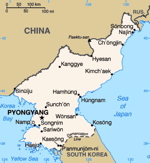In a surprising -- but typically unexpected -- move, North Korea has agreed to return to the Six-Party Talks. Both the United States and North Korea have made concessions, brokered by China, to achieve this long-hoped-for diplomatic reengagement. The United States is not insisting on tangible demonstrations of nuclear rollback as a prerequisite to talks and, to achieve the reengagement, it met in a secret diplomatic forum in Beijing that included only representatives from China and North Korea. North Korea has dropped its insistence that the United States removes its financial restrictions on its overseas monies, being satisfied with U.S. assurances that this issue will be discussed within the framework of the talks. But what motivated the Kim regime to take this step? And what are the prospects for progress as a result? The talks between North Korea, the United States, China, Russia, Japan and South Korea are now expected to resume in November. This dialogue has been stalled for over a year. Pyongyang walked away from an agreement that would have seen it abandon its nuclear program in return for various incentives that could have addressed its critical and chronic energy, food and economic needs. The withdrawal in November 2005 was prompted by U.S.-led investigations into North Korean finances -- stemming from its counterfeiting of U.S. currency and other illegal activities -- held in a Macau bank. The United States has repeatedly sought to decouple this from the nuclear crisis. It is ironic that, together with the threats of targeted economic sanctions, this seems to have forced Kim Jong Il back to the negotiating table. Bob Einhorn, a former U.S. assistant secretary of state for nonproliferation, recently stated that he does not hold much hope for achieving anything in a return to talks. However, he went on to say that it is prudent to "hold the door ajar" to give Pyongyang a way out of its predicament. Given the pressure of its closest ally, China, and the international community in the wake of the Oct. 9 nuclear test, and given that ongoing financial restrictions may risk the collapse of the North Korean regime, perhaps Kim will walk through that door. North Korea does appear to be running out of options. On the other hand, recognizing that the test was more of a fizzle than a bang, there might be other motivations behind Kim's agreement to return to the talks.
Kim’s Intentions Unclear in Return to Six-Party Talks

